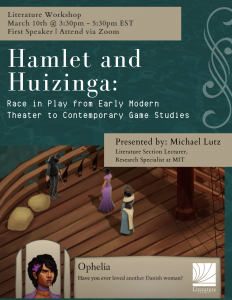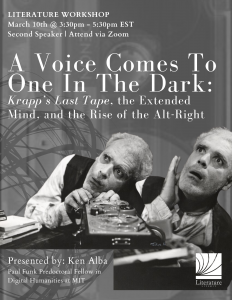 TITLE: Hamlet and Huizinga: Race in Play from Early Modern Theater to Contemporary Game Studies
TITLE: Hamlet and Huizinga: Race in Play from Early Modern Theater to Contemporary Game StudiesPRESENTED BY: Michael Lutz Literature Section Lecturer, Research Specialist at MIT March 10th, 2021 @ 3:30pm EST on Zoom
ABSTRACT: This talk attempts to think play transhistorically, from the early modern theater to contemporary game studies. Beginning with Shakespeare, I will sketch a model of early modern play that I bring into conversation with the 20th century play theories of Johan Huizinga and Roger Caillois. Both thinkers are foundational to game studies, but their theories of play are also marked by racist assumptions and cultural chauvinism. And as it turns out, early modern theories of play may be, too. I conclude with a look at the 2019 videogame Elsinore, a Hamlet adaptation where the player takes on the role of Ophelia, here depicted as a Black woman, and I consider how the game both inherits and interrogates a legacy of race in play.
—
TITLE: A Voice Comes To One In The Dark: Krapp’s Last Tape, the Extended Mind, and the Rise of the Alt-Right
PRESENTED BY: Ken Alba, Paul Funk Predoctoral Fellow in Digital Humanities at MIT
March 10th, 2021 @ 3:30pm EST on Zoom
 ABSTRACT: Krapp’s Last Tape stands out among Beckett’s drama for its sentimentality. In a characteristically self-mocking statement from a 1958 letter to Donald McWhinnie, Beckett himself described the play as “rather a s[e]ntimental affair in my best original English manner.” This sentimentality is backwards-looking, obsessed as Krapp is with memory, and undercut by Krapp’s own cynicism throughout. Paradoxically, however, Krapp is also the closest Beckett gets to science fiction, set as it is on a late evening in the future and centered on then-futuristic technology: the magnetic tape recorder, which serves as a cognitive prosthesis that extends Krapp’s memory. The play thus looks forward in order to look back, utilizing then-novel media technology to present – or undermine, as it were – a nostalgic vision of a brighter past.
ABSTRACT: Krapp’s Last Tape stands out among Beckett’s drama for its sentimentality. In a characteristically self-mocking statement from a 1958 letter to Donald McWhinnie, Beckett himself described the play as “rather a s[e]ntimental affair in my best original English manner.” This sentimentality is backwards-looking, obsessed as Krapp is with memory, and undercut by Krapp’s own cynicism throughout. Paradoxically, however, Krapp is also the closest Beckett gets to science fiction, set as it is on a late evening in the future and centered on then-futuristic technology: the magnetic tape recorder, which serves as a cognitive prosthesis that extends Krapp’s memory. The play thus looks forward in order to look back, utilizing then-novel media technology to present – or undermine, as it were – a nostalgic vision of a brighter past.This contradiction is typical for ‘new’ media technology. In a political moment characterized by rapid technological change and a concomitant appeal to nationalism, however, the contemporary counterpart to Krapp’s sentimental tapes has a much wider audience. Where Krapp’s tapes are private, the modern equivalent to the tape recorder is networked by default, social by definition, and public – and thus political – by nature. A 2019 New York Times investigation catalogues the role of Youtube’s algorithm and its alt-right content in “redpilling,” or radicalizing, angry young men with content that valorizes “traditional” conservative values drawn from an imagined American past. In the information age, mediated nostalgia has been weaponized.
This presentation, then, will explore how Beckett, in Krapp’s Last Tape and elsewhere, both presents and complicates a nostalgic, sentimental approach to the past mediated through information technology. This complication will be coupled with a discussion of the dissemination of nostalgic nationalism across contemporary platforms like YouTube and Twitter. If we cannot expect with Marshall McLuhan that art can provide an “immunity” to the ways that media reorganize our relationship to our past and our present, we might with him hope that it can help us “ride with the punch.”
